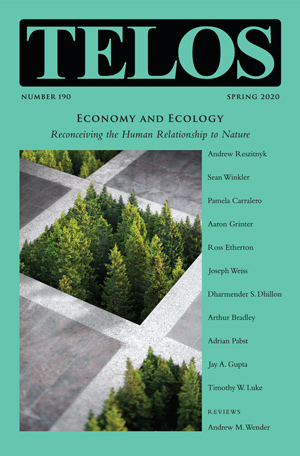Joseph Weiss’s “The Old in New Critical Theory: Locating the Gambler and the Prostitute in the Image of Neoliberalism” appears in Telos 190 (Spring 2020): Economy and Ecology: Reconceiving the Human Relationship to Nature. Read the full article at the Telos Online website, or purchase a print copy of the issue in our online store. Individual subscriptions to Telos are available in both print and online formats.
 This essay is part of a larger project that aims to trace the return of the old in “new” critical theory. It attempts to demonstrate how, after the failure of the second generation of the Frankfurt School to situate the ongoing antagonisms of neoliberal social relations, several of the concepts of the first generation weigh on the comportment of “new” critical theory. More specifically, by examining the figures of the gambler and the prostitute in relationship to Walter Benjamin and Theodor W. Adorno’s conception of the dialectical image, we observe just how much the critique of commodity fetishism, the use of rhetoric in historico-philosophical presentation, as well as the analysis of political economy and class relations, continue to assert themselves as pressing needs for social theory. In beginning to perform this “new” critical theory that heeds the dialectical tension between the past and present, an image of the unfulfilled desires at work in both the idea of communism and neoliberalism ultimately comes to the fore. Instead of undialectically discarding these figures as morally bankrupt or expressions of mere illusion and falsehood, we are called to capture the truth of their appearance, i.e., the ambivalent desire that promises submission to domination at the same time that it highlights an indispensable moment in the real possibility of emancipation.
This essay is part of a larger project that aims to trace the return of the old in “new” critical theory. It attempts to demonstrate how, after the failure of the second generation of the Frankfurt School to situate the ongoing antagonisms of neoliberal social relations, several of the concepts of the first generation weigh on the comportment of “new” critical theory. More specifically, by examining the figures of the gambler and the prostitute in relationship to Walter Benjamin and Theodor W. Adorno’s conception of the dialectical image, we observe just how much the critique of commodity fetishism, the use of rhetoric in historico-philosophical presentation, as well as the analysis of political economy and class relations, continue to assert themselves as pressing needs for social theory. In beginning to perform this “new” critical theory that heeds the dialectical tension between the past and present, an image of the unfulfilled desires at work in both the idea of communism and neoliberalism ultimately comes to the fore. Instead of undialectically discarding these figures as morally bankrupt or expressions of mere illusion and falsehood, we are called to capture the truth of their appearance, i.e., the ambivalent desire that promises submission to domination at the same time that it highlights an indispensable moment in the real possibility of emancipation.







